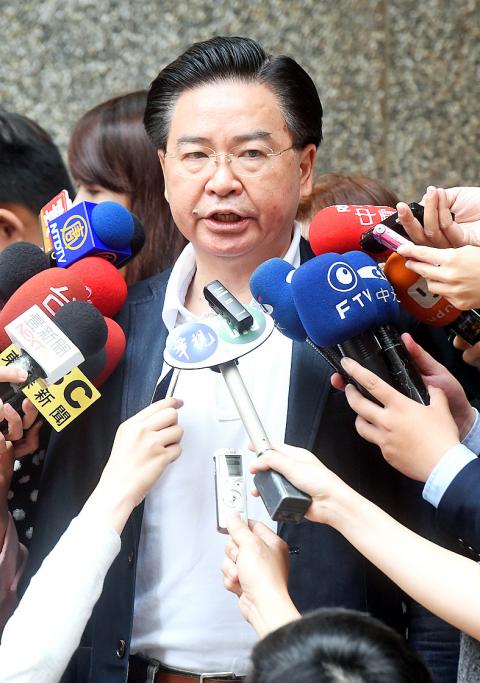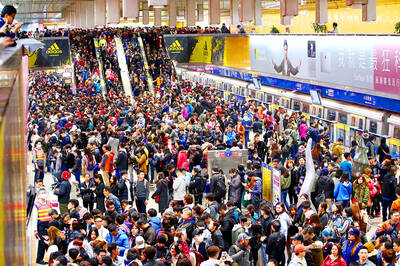Incoming secretary-general of the National Security Council Joseph Wu (吳釗燮) yesterday said the future Democratic Progressive Party (DPP) government would “cautiously consider” the option of dispatching navy vessels to protect Taiwanese fishermen operating in disputed waters.
“Government agencies already have their own modes of operation. As the decision to deploy navy vessels bears great military significance, we must think about this option discreetly,” Wu said in response to media queries on whether the DPP government would consider sending naval ships to protect Taiwanese fishermen after it takes office on May 20.
However, Wu said that there would be no “discount” in the DPP government’s determination to keep the nation’s fishermen safe at sea and that it would make every effort to safeguard their interests.

Photo: Chien Jung-fong, Taipei Times
Wu made the remarks on the sidelines of the second and final day of a “Cabinet consensus-building camp” held by the DPP in Taipei, as the Coast Guard Administration and the Council of Agriculture — the administrative body of the Fisheries Agency — sent a patrol vessel and a fishing training ship respectively on a month-long mission to protect Taiwanese fishermen near Japan’s Okinotori atoll in the Pacific Ocean.
The deployment of the two vessels came amid growing tensions between Taipei and Tokyo over the latter’s confiscation of a Taiwanese fishing boat, Tung Sheng Chi No. 16, about 150 nautical miles (277.8km) east-southeast of the uninhabited atoll on Monday last week.
Japan claims a 200 nautical-mile exclusive economic zone around the outcropping, of which the legal status is still deputed.
Although the Tung Sheng Chi No. 16 and its crew were released the next day after the boat’s owner, Pan Chung-chiu (潘忠秋), met Tokyo’s demand in making a payment of a security deposit of NT$1.76 million (US$54,442), Premier Simon Chang (張善政) on Saturday said that Taiwanese navy vessels have been put on “stand-by mode” and would be deployed when necessary.
Wu also issued a four-point statement on behalf of the DPP, in which the party said it is the government’s duty to protect Taiwanese fishermen and that the incoming DPP administration would continue all measures that have been adopted for the purpose.
Second, given that Taipei and Tokyo have long established a negotiation mechanism for fishing rights, follow-up negotiations should be carried out through the said mechanism to ensure the matter is settled, Wu said.
“Third, both sides should exercise restraint before the controversy fades away, particularly Japan, which is urged to refrain from any future harassment of our fishermen,” Wu said. “Lastly, the incoming DPP government would negotiate with Japan after being sworn in to make sure that the interests of our fishermen remain unaffected.”
As for whether president-elect Tsai Ing-wen (蔡英文) would attend the inauguration ceremony of the expanded Panama Canal in the Central American nation next month, Wu said the matter has not been decided and that Tsai would explain her decision once it is made.

People can take the Taipei MRT free of charge if they access it at Nanjing Sanmin Station or Taipei Arena Station on the Green Line between 12am and 6am on Jan. 1, the Taipei Department of Transportation said on Friday, outlining its plans to ease crowding during New Year’s events in the capital. More than 200,000 people are expected to attend New Year’s Eve events in Taipei, with singer A-mei (張惠妹) performing at the Taipei Dome and the city government’s New Year’s Eve party at Taipei City Hall Plaza, the department said. As people have tended to use the MRT’s Blue or

Civil society groups yesterday protested outside the Legislative Yuan, decrying Chinese Nationalist Party (KMT) efforts to pass three major bills that they said would seriously harm Taiwan’s democracy, and called to oust KMT caucus whip Fu Kun-chi (傅?萁). It was the second night of the three-day “Bluebird wintertime action” protests in Taipei, with organizers announcing that 8,000 people attended. Organized by Taiwan Citizen Front, the Economic Democracy Union (EDU) and a coalition of civil groups, about 6,000 people began a demonstration in front of KMT party headquarters in Taipei on Wednesday, organizers said. For the third day, the organizers asked people to assemble

Taipei is participating in Osaka’s Festival of Lights this year, with a 3m-tall bubble tea light installation symbolizing Taiwan’s bubble tea culture. The installation is designed as a bubble tea cup and features illustrations of Taipei’s iconic landmarks, such as Taipei 101, the Red House and North Gate, as well as soup dumplings and the matchmaking deity the Old Man Under the Moon (月下老人), affectionately known as Yue Lao (月老). Taipei and Osaka have collaborated closely on tourism and culture since Taipei first participated in the festival in 2018, the Taipei City Department of Information and Tourism said. In February, Osaka represented

Taiwanese professional baseball should update sports stadiums and boost engagement to enhance fans’ experience, Chinese Professional Baseball League (CPBL) commissioner Tsai Chi-chang (蔡其昌) told the Liberty Times (sister paper of the Taipei Times) in an interview on Friday. The league has urged Farglory Group and the Taipei City Government to improve the Taipei Dome’s outdated equipment, including relatively rudimentary television and sound systems, and poor technology, he said. The Tokyo Dome has markedly better television and sound systems, despite being 30 years old, because its managers continually upgraded its equipment, Tsai said. In contrast, the Taipei Dome lacked even a room for referees